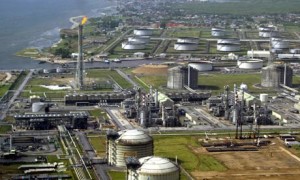
Minister of Information and Culture, Alhaji Lai Mohammed, has said that the Nigeria Liquefied Natural Gas (NLNG) was the country’s best success story because it was 100 per cent run by Nigerians.
The minister said this when he visited the NLNG plant on Tuesday in Bonny, Rivers State.
Mohammed said: “When you look at the complexity of its operations, you will be surprised and be proud that the company is being run by Nigerians.
“All patriotic Nigerians should therefore ensure that the NLNG does not die because what we are looking at is actually the incubator for our growth in the oil and gas industry.’’
He said that although people saw Nigeria as an oil producing nation, the country had more potential in gas.
The minister added that all hands must be on deck to encourage NLNG for the growth of the sector.
He said that if the NLNG was encouraged and nothing was done to stifle its operations, the country could take a cue from what Qatar had done with gas.
Mohammed said that the nation had huge assets in the NLNG, adding that every patriotic citizen must ensure its survival.
“I have been hearing about the NLNG, but coming here, having a first-hand experience, information, briefing and tour of the place has actually changed my mind completely.
“I have come out awed, inspired, excited and proud to be a Nigerian, Muhammed said.
Before conducting the minister round the complex, the NLNG Managing Director, Tony Attah, said the company was incorporated in 1989 to harness Nigeria’s vast natural gas resources.
He said the company produced Liquefied Natural Gas (LNG), Natural Gas Liquid (NGL) and Liquefied Petroleum Gas (LPG) for export and local consumption.
According to the NLNG boss, the company was established after over 30 years of unsuccessful efforts to attract foreign investors in the LNG sectors.
He said the company was owned by four shareholders: the Federal Government represented by NNPC (49 per cent), Shell (25.6 per cent), Total LNG Nigeria Ltd (15 per cent) and Eni (10.4 per cent).
Attah said from the initial investment of six billion dollars, the company now had an asset base of over 11 billion dollars and had generated over 90 billion dollars in revenues.
He said NLNG had grown from one to a six-train operation with capacity of 22 million tonnes per annum and it was on the verge of achieving two more trains for its operation.
The NLNG chief said that the company contributed 15 billion dollars to the federal government in dividends over the last 12 years and had also paid over 5.5 billion dollars in taxes.
He said that the proposed amendment of the NLNG Act by the National Assembly to force the company to remit three per cent of its annual budget to fund the Niger Delta Development Commission would stifle its operation.
Attah said the amendment was an anomaly that threatened to negate the guarantee and assurance which inspired the shareholders to invest in the company.
He said the amendment would portray Nigeria as “a promise-breaker and untrustworthy, damaging the country’s reputation and hamstringing its ability to attract further foreign investment’’.
According to him, the amendment will lead to immediate loss of foreign investment of 25 billion dollars in respect of Trains Seven and Eight, which the company was actively working to take a final investment decision on.
Attah said the three per cent NDDC levy the amendment sought to introduce should not apply to NLNG because it was not an upstream oil and gas company.
The NLNG chief added that the company did not produce gas but bought gas like fertiliser companies and power producers which do not pay such levy.
He argued that NLNG had contributed immensely to the nation’s economy and had the potential to contribute more, adding that any action taken to stifle its operation would be counter-productive.